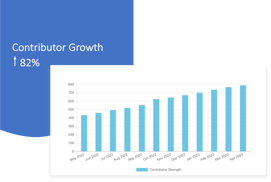Flyte adopts a new community governance model
The Linux Foundation | 02 May 2023
.png?width=466&height=184&name=unnamed%20(42).png)
Author: David Espejo (OSS Developer Advocate, Union.ai)
“The barrier to entry in AI is lower than ever before, thanks to open source software” says Dr. Ibrahim Haddad, Executive Director of the AI & Data Foundation, the organization that hosts some of the most critical projects in the ML/Data ecosystem. Keeping those barriers low, and creating new mechanisms for AI practitioners to develop expertise by contributing to open source, is a top priority for projects like Flyte.
Flyte delivers a distributed processing platform that supports highly concurrent, scalable, and maintainable machine learning and data processing workflows. Flyte achieves that goal by providing robust abstractions to handle many of the complex details of the underlying Kubernetes infrastructure. Meanwhile, it facilitates the separation of concerns and fast collaboration between data and ML teams, reducing the time to value for production ML models.

Flyte is used in production by organizations of all sizes in different markets
It’s a daunting task that’s only possible thanks to the collaborative nature of open source. As a graduate AI & Data Foundation project, Flyte looks for sustainable ways to onboard and support a diverse community of adopters and contributors from different backgrounds, affiliations, and levels of expertise, working together to improve the tools that help them solve some of the challenges of getting ML projects to production.
Such a partnership requires a transparent process and a clear set of expectations, goals, and responsibilities, especially considering the values the Flyte community seeks to represent: autonomy, self-governance, productivity, and inclusion.
In open source, “governance” typically refers to the roles and responsibilities community members can take on, including the decision-making process and the criteria to aspire to positions of higher commitment.
Inspired by the CNCF’s Contributor Ladder, the Cloud Foundry Foundation governance model, and the “Circles” model defined by the CommunityRule project, the Flyte community is introducing an updated governance model with the following goals in mind:
- Define a clear path to maintainership, helping with the project’s sustainability and scalability
- Communicate diverse ways to get involved in the community
- Implement a structure that privileges delegation and autonomy
- Advocate for a decision-making process that is expedited but seeks consensus among community members
- Build a Technical Steering Committee that is diverse enough to represent the interests of different types of organizations and projects in the community
The overarching goal: introduce structure while maintaining rapid innovation by fostering a healthy, diverse, sustainable, and collaborative environment.
 Additionally, the RFC process has been updated to reduce the barriers to proposing new ideas and implementing the leadership role of the Technical Steering Committee. Special interest Groups/Working Groups are also being added to the model to facilitate more focused collaboration among community members.
Additionally, the RFC process has been updated to reduce the barriers to proposing new ideas and implementing the leadership role of the Technical Steering Committee. Special interest Groups/Working Groups are also being added to the model to facilitate more focused collaboration among community members.
The Flyte community is highly motivated, demonstrated by an 82% contributor growth rate during the past year — according to LF Insights — and we’re excited to serve our community members’ needs with a more robust, transparent, and scalable collaboration model.
Check out the contributing section and the new GOVERNANCE document to learn how to get involved with Flyte!
Flyte resources
Read more about LF AI & Data Foundation projects here.